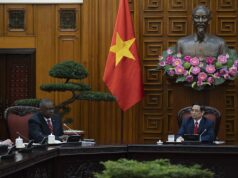There is a saying that goes: “If it ain’t broke, don’t fix it.” It is American slang that suggests to not try to fix things that are not broken as the attempted improvement might backfire.
Some senators are calling for the overhaul of the Inter-Agency Task Force for the Management of Emerging Infectious Diseases, better known as the IATF, saying that it has shown itself as incapable of handling the pandemic.
Citing a “system-wide failure,” Senator Risa Hontiveros said that the IATF should be led by public health experts “who actually know how to handle a public health emergency,” and not by military officers.
Senator Ralph Recto likens the IATF to a race car, of which the senator knows Health Secretary Francisco Duque to be an enthusiast. If a race car fails to win a race after several tries, it’s time to change engine or driver, maybe both, the senator says.
Senator Nancy Binay agrees some changes are necessary, like a change of policy makers. She points out that we have never flattened the curve when other countries are already on their third wave. She sees the Philippines overtaking Indonesia in COVID-19 statistics. She finds Secretary Duque going around town personally distributing face shields a ridiculous way of addressing the pandemic problem.
It will be recalled that in April last year, 14 senators signed a resolution seeking Health Secretary’ Francisco Duque’s resignation for his “failure of leadership, negligence, lack of foresight, and inefficiency” in the measures and actions carried out by the department he heads. The signatories were Senators Binay, Tito Sotto, Migs Zubiri, Panfilo Lacson, Sonny Angara, Grace Poe, Manny Pacquiao, Sherwin Gatchalian, Francis Tolentino, Joel Villanueva, Ronald dela Rosa, Imee Marcos, Lito Lapid, and Bong Revilla.
Senator Imee Marcos goes beyond calling for an overhaul of the IATF. She wants it abolished altogether. The proposed abolition of the IATF was backed by Senator Sotto, citing what he said is the “gross incompetence” of the Department of Health in handling the pandemic.
But Presidential Spokesman Harry Roque has dismissed calls to abolish the IATF amid the surge of COVID-19 cases in the country. Quoting officials of the Department of Health, he said the rise of COVID-19 cases can be attributed to the presence of new coronavirus variants in the country. “Whether we accept it or not, the virus has mutated and it may not be for us to blame the IATF for the virus to have done so and become more infectious,” the spokesman said in Filipino.
Nobody has blamed the IATF for the mutation of the virus and its becoming more infectious. That is the course of nature. It mutates as it transfers from one person to another. To prevent its transmission to another person, people should be immunized to the virus. This is what people fault the IATF for. The IATF has failed miserably in the timely procurement of vaccines.
The government’s objective is to vaccinate 70% of the 100 million population by the end of 2022 to achieve herd immunity. Based on the way Vaccine Czar Carlito Galvez has handled the procurement of the needed amount of vaccine, it is very unlikely that the target of 70 million Filipinos vaccinated by December of 2022 will be achieved.
First, he has signed deals for only about one-third of the doses needed. Second, distributing the vaccines all over the archipelago is a much more arduous task than procuring the vaccines. Second, many places in island provinces do not have the refrigerated storage facility required by some of the vaccines ordered.
Of the 9,808 new cases last Saturday, more than 5,000 of them are in Metro Manila. Instead of shipping vaccines to sparsely populated island provinces like Catanduanes, Romblon, and Marinduque, they should have been administered in densely populated but tightly locked down Metro Manila, thus achieving herd immunity in one large area.
Health expert Dr. Ted Herbosa, special adviser to the IATF, dismissed proposals to abolish it. According to him, the IATF “specifies a systematic approach using science, good operations, good implementation, and social interventions. Abolishing the IATF now means replacing it with another interagency body because the approach to a pandemic must be a whole of government (sic). A change in the system in the middle of a response like this will be detrimental to everyone. We are here already, so we move to a better and stronger approach. We now know what works and what does not work unlike a year ago,” he added.
I understand why the good doctor is opposed to the abolition of the IATF. First, it would mean the loss of a prestigious designation — adviser to a group of czars. Second, it would be a reflection of the ineffectiveness of his advice to the czars.
The whole country has been under general community quarantine for one whole year but the situation has worsened. That only indicates the current IATF system has not worked.
And the IATF is not moving to a better and stronger approach as Dr. Herbosa says. In fact, the IATF has placed Metro Manila in the same situation it was in a year ago — in enhanced community quarantine, although called differently this time as NCR Plus. ECQ was a failure.
Yet the Dr. Herbosa-advised IATF has adopted the failed approach.
The IATF is broke, it should be fixed. As Senators Binay, Recto, and Hontiveros have said, a change in policy makers is long overdue. A change in its leadership has become extremely necessary. It has been done many times before to snatch victory from the jaws of defeat.
In 1862, during the American Civil War, President Abraham Lincoln replaced George McClellan as general-in-chief of the Union Army for his failure to pursue Confederate General Robert E. Lee’s Army after the Union victory in Antietam, Maryland.
In 1943, Gen. Dwight D. Eisenhower, Supreme Commander of the Allied Forces in Europe, replaced his subordinate Maj. Gen. Lloyd Fredendall with the brash, aggressive Maj. Gen. George Patton who repulsed the offensive launched by German Field Marshal Erwin Rommel, the Desert Fox, in Tunisia.
In 1995, President Fidel V. Ramos ordered the relief of Southern Command chief Brig. Gen. Regino Lacson just two days after Abu Sayyaf elements raided the town of Ipil, Zamboanga del Sur, killing 53 people and razing to the ground four blocks of the commercial center. That Gen. Lacson had just been assigned to the Southern Command six weeks before did not excuse him from blame.
Dr. Duque, Gen. Delfin Lorenzana, Gen. Eduardo Año, Gen. Carlito Galvez, and Gen. Roy Cimatu have been given much more time than Gen. Regino Lacson to prove themselves worthy of their assignments. They have not accomplished their mission. It’s time for them to fade away.
Oscar P. Lagman, Jr. is a retired corporate executive, business consultant, and management professor. He has been a politicized citizen since his college days in the late 1950s.



